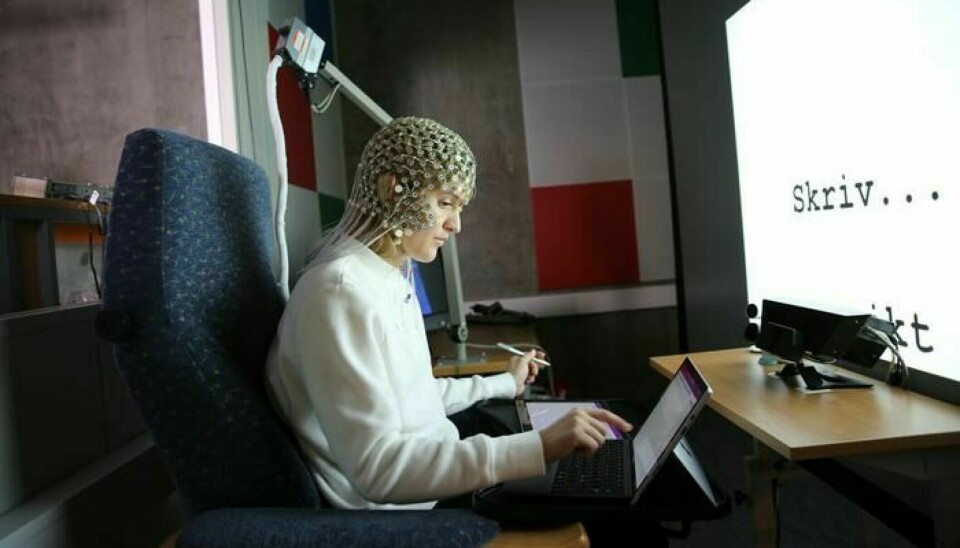
Writing by hand activates more areas of the brain than typing on a keyboard
Should pupils and students go back to pen and paper?
Laptops and tablets have become effective tools for pupils and students in recent years.
Most probably type faster on a keyboard than they can write with a pen or pencil.
Still, the discussion has been ongoing: Is typing as good as writing?
A new study from the Norwegian University of Science and Technology – NTNU suggests otherwise.
Keyboard and digital pen
The study, published in the scientific journal Frontiers in Psychology, consisted of 36 study participants. All were university students. They had 256 small sensors mounted on their heads to measure their brain activity.
The students were instructed to write specific words either on a keyboard or by hand. When asked to type the word, they used a single finger on a keyboard.
When they wrote by hand, it was done with a digital pen on a screen.
The sensors measured the activity in the different parts of the brain for five seconds during the task.
Forming of the letters
The measurements showed that several parts of the brain worked together when the participants wrote by hand. When typing on a keyboard, the researchers could not see the same increase.
The researchers expect that the results would have been the same if the students used a pen with ink on paper.
“We have shown that the differences in brain activity are related to the careful forming of the letters when writing by hand while making more use of the senses,” neuroscientist Audrey van der Meer explains in a press release. She is one of the researchers behind the study.
Most viewed
They simply do not believe that the simple and repetitive movements of typing on a keyboard serve the same purpose.
Do we need to feel the letters physically?
The researchers say that children who have learned to read and write on tablets might struggle to understand the difference between mirrored letters, such as b and d.
“They literally haven’t felt with their bodies what it feels like to produce those letters,” van der Meer says.
In a forskning.no article from OsloMet in 2021, professor of visual arts Ingeborg Stana commented on the same topic.
Necessary for the best possible development of the brain
“When we use pen and paper, more parts of the brain are activated than by typing on a keyboard. Handwriting gives the brain more cues to remember,” Ingeborg Stana explained in the article.
“In short, learning to write by hand at primary school is absolutely necessary for the best possible development of the brain. A brain that doesn’t develop optimally can, in turn, affect school performance,” Stana said in 2021.
Not everyone has agreed with the research results from NTNU.
Critical of the study in 2020
In 2020, NTNU researchers also published a study on this. It included 12 children and 12 adults. Jan Frode Lindsø expressed his scepticism towards the study and its findings in a debate article on forskersonen.no (link in Norwegian).
He argues that media reports frequently oversimplify the findings of research studies.
Among other things, he questioned the connection between brain activity and what people actually learn.
This uncertainty was pointed out by the researchers themselves in the 2020 study.

Must use technology correctly
It is possible to learn the curriculum without pen and paper, according to university lecturer Marianne Hagelia. Her insights were featured in an article by the University of South-Eastern Norway, published on forskning.no in 2018. In the article, she provided tips for digital tools to learn efficiently.
She believed that students should not rely on their memory.
"Although it might seem like a waste of time, investing time in discovering and learning to use quality apps and tools is a wise approach to time management. I strongly advocate for our students to acquire these skills. They're losing out on a lot of precious time by not utilising efficient note-taking resources," Hagelia said.
She further stated that many associate study technique with listening to a lecturer, reading, highlighting important words and text, writing down a condensed version in the notebook – and cramming.
"Merely transcribing books or lecture notes without reviewing and refining those notes later amounts to a significant waste of effort," she concluded.
We should not abandon computers entirely
Researchers argue that handwriting practice remains essential for pupils and students.
Even though NTNU researchers advocate for more pen and paper, they do not mean that we should return to a time without laptops and tablets.
“There’s some evidence that students learn and remember more when they take lecture notes by hand. At the same time, using a computer with a keyboard can be more productive when writing a long text or an essay,” van der Meer says.
———
Translated by Alette Bjordal Gjellesvik
Read the Norwegian version of this article on forskning.no
Reference:
van der Weel, F.R. & van der Meer, A.L.H. Handwriting but not typewriting leads to widespread brain connectivity: a high-density EEG study with implications for the classroom, Frontiers in Psychology, vol. 14, 2023.







































